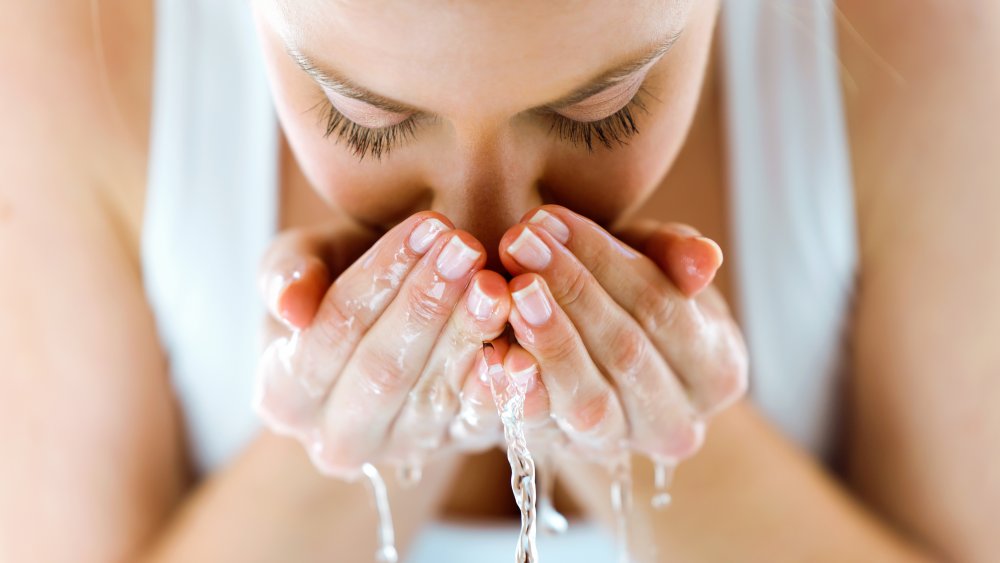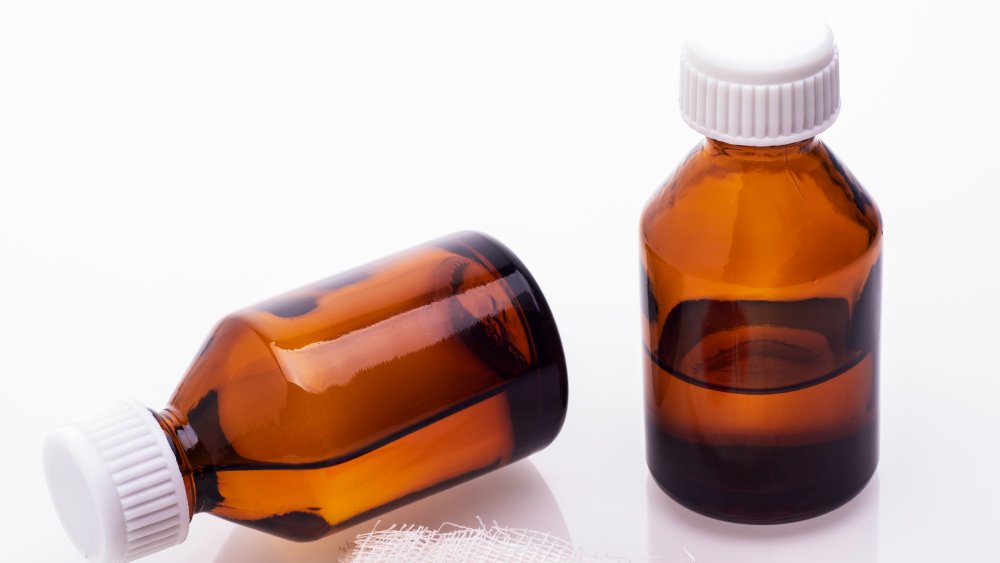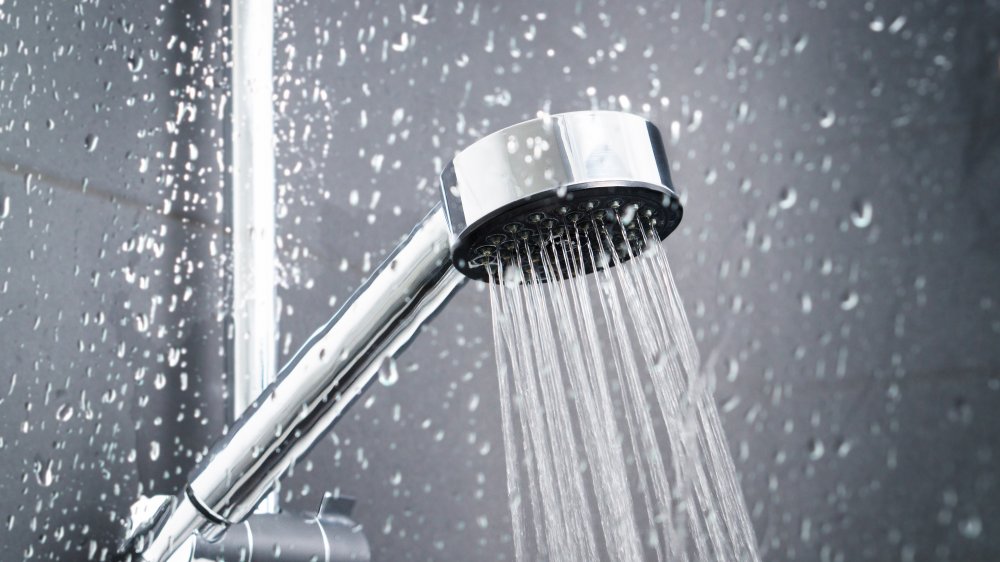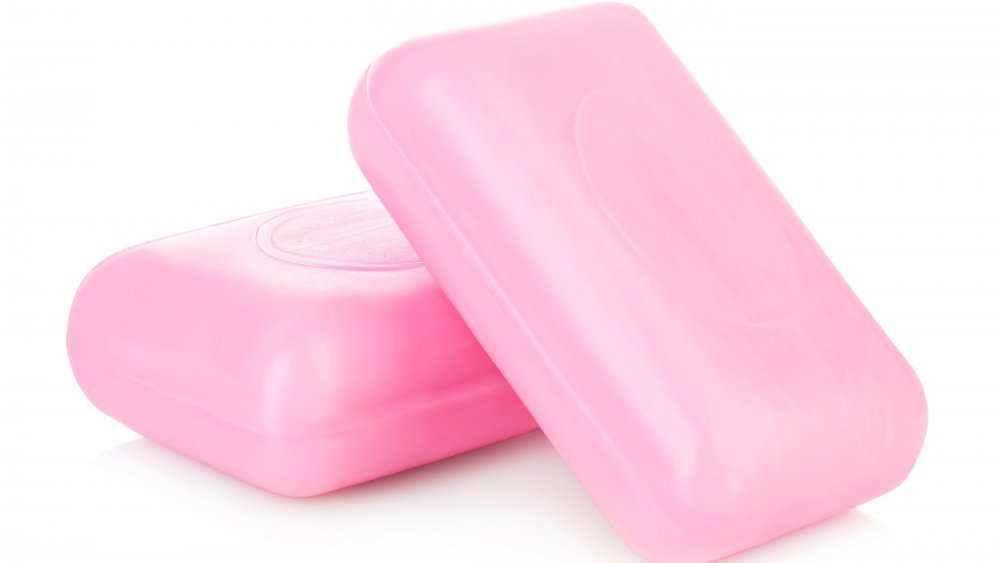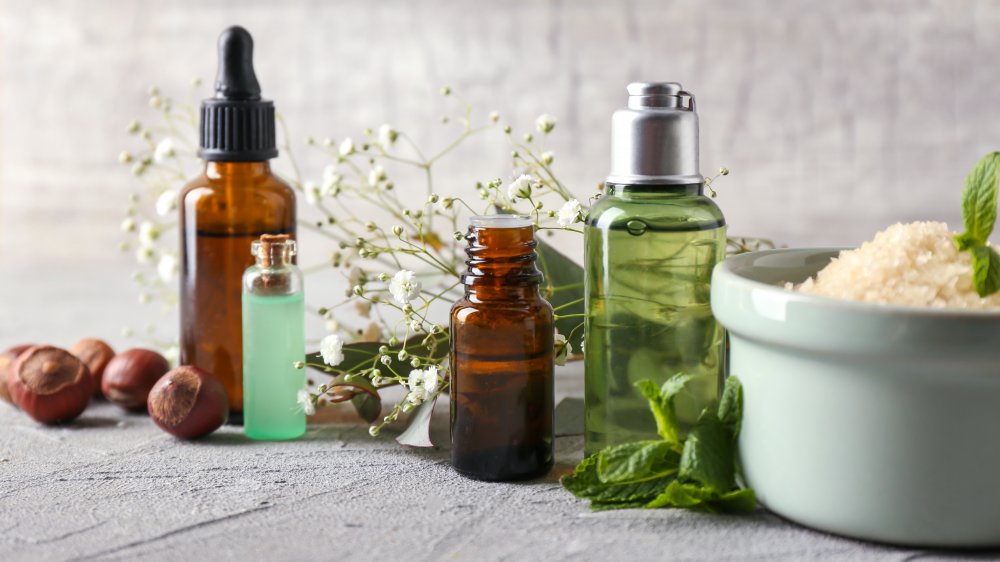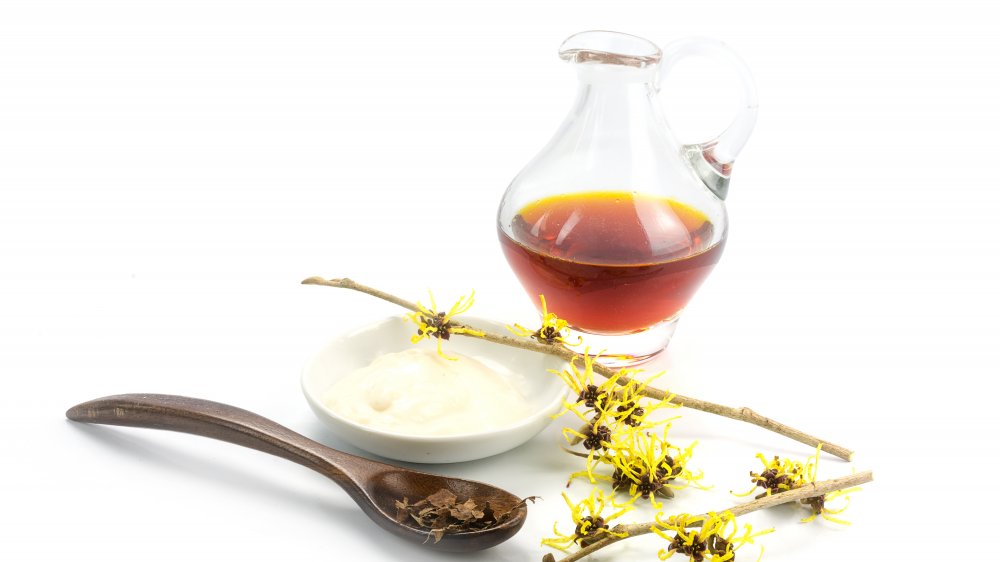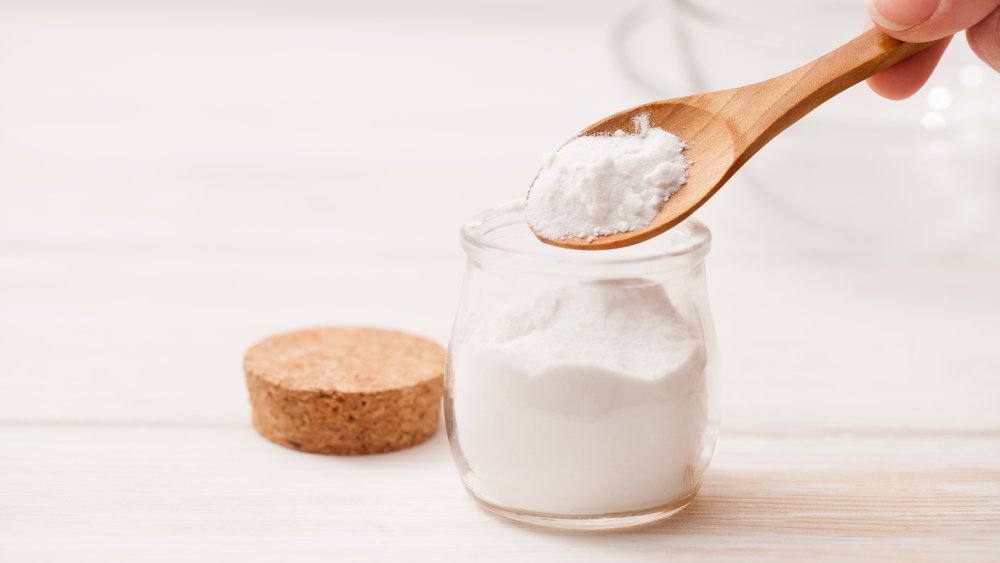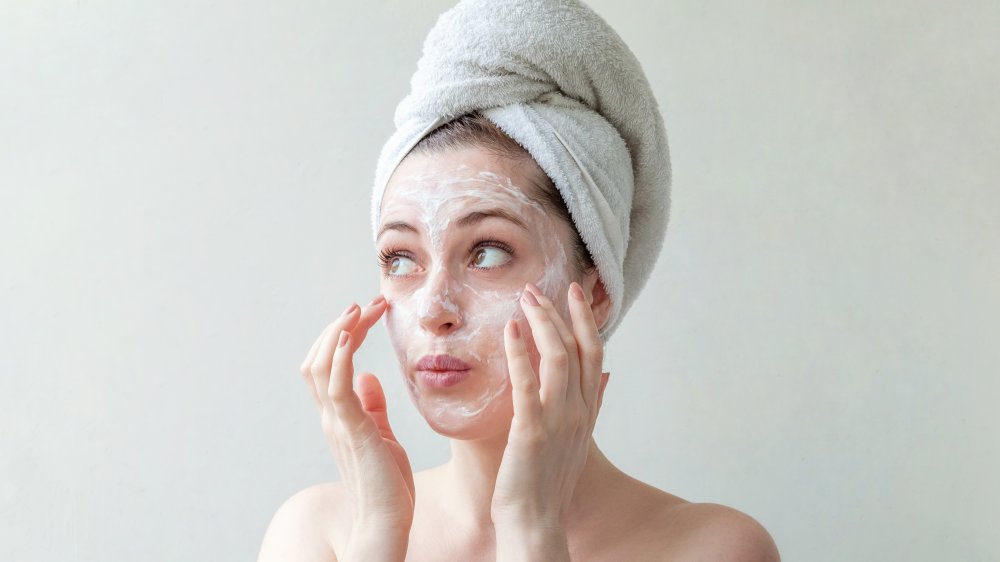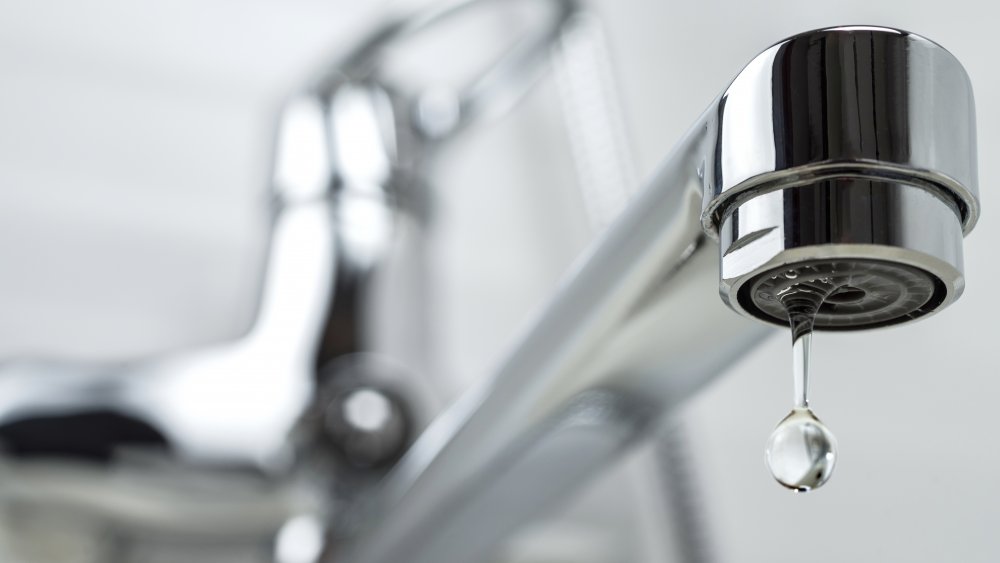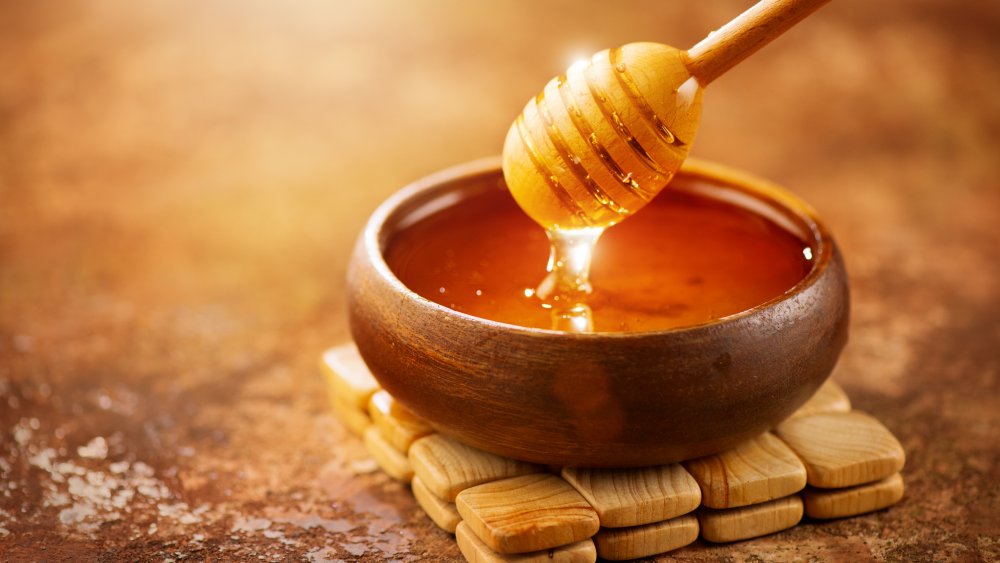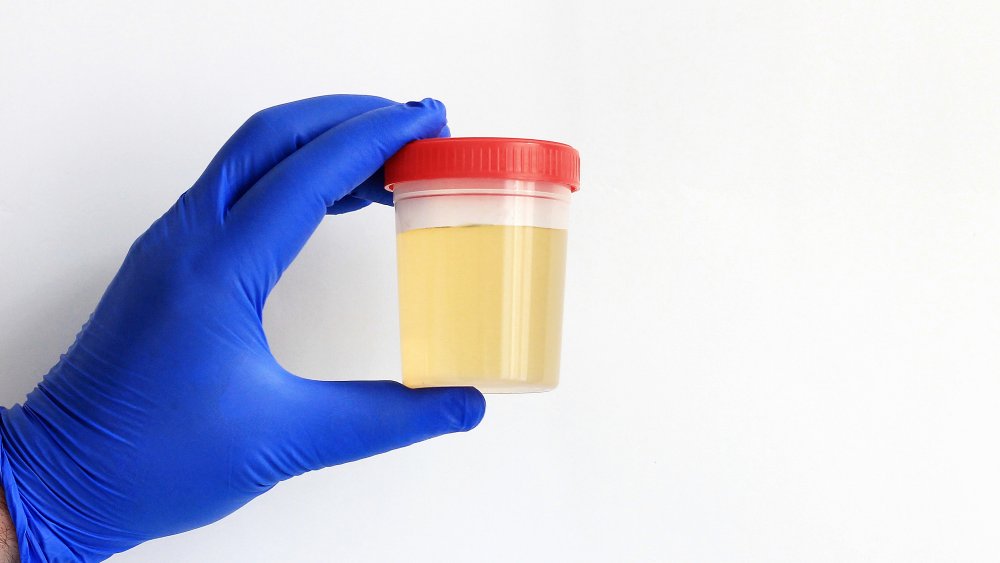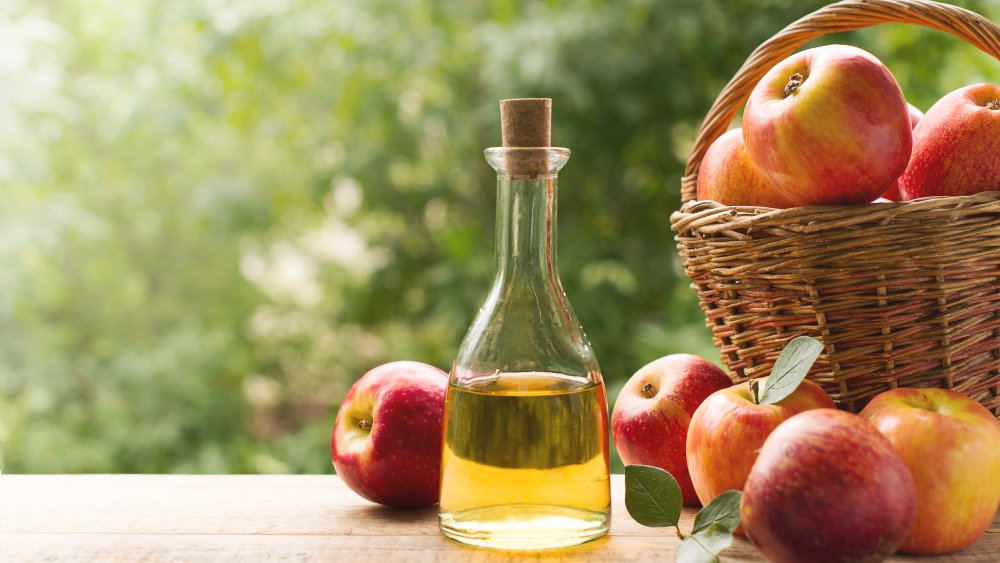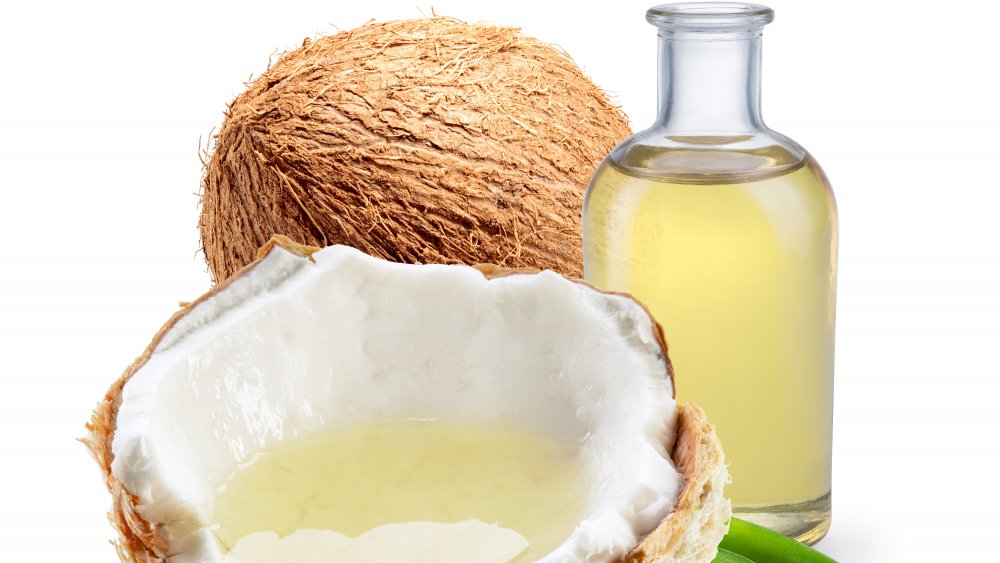14 Things You Should Never Wash Your Face With
We may receive a commission on purchases made from links.
Skincare routines are great, but there are some things you should never wash your face with — even if your favorite celebrity or Instagram influencer swears by it to achieve their glowing complexion (spoiler alert: they often spend a lot of money for that fabulous skin). While some people opt for the Korean beauty-inspired 10-step skincare routine, others just splash some water on their faces and call it a day. And, while we wish there were no "wrong" way to achieve healthy skin, there are some harmful skincare products and natural remedies you'll want to avoid.
It's true that you should ultimately choose a way to care for your skin that, naturally, works for your skin, you do need to be careful when adding to your routine. "You kind of have to do what works for you, try not to do too many things at once, and also talk to your dermatologist," Mary L. Stevenson, assistant professor of dermatology at New York University Langone Medical Center, told Self. Still, experts tend to agree on certain no-nos for your skin. These are some things you should never use to wash your face.
You should never wash your face with this medicine cabinet staple
Anyone who has ever run out of face wash and wanted to avoid running out to the store for more has probably looked up some alternatives to get their skin squeaky clean. That often leads to raiding the medicine cabinet to peruse your options. Hydrogen peroxide is one of the most common household items people have and it's easy to think that it would work just fine as a facial cleanser. After all, it's commonly used to clean cuts and scrapes, so it would make sense that the chemical solution could be used to clean the dirt and debris on your face.
But really, hydrogen peroxide is not a great alternative to your daily face wash. According to WebMD, hydrogen peroxide can actually harm and irritate your skin. Additionally, a report published in the The Journal of Trauma: Injury, Infection, and Critical Care revealed that hydrogen peroxide can actually disrupt and slow down wound healing, which obviously isn't ideal for people with acne.
You should never wash your face with hot water
Although many people believe hot water is better at killing bacteria than cold water, science says otherwise. But, how does that translate to washing your face? Hot water can be great at producing steam, which is awesome for the health of your skin, but hot water in and of itself is actually pretty dangerous.
Why? According to Rachel Nazarian, a board-certified dermatologist at Schweiger Dermatology Group in New York, it's because of the reaction hot water causes. "Hot water and temperatures will dilate blood vessels and capillaries," the expert told Marie Claire. "That can leave skin red and aggravate conditions like rosacea, which ultimately leads to broken and permanently dilated vessels." Sure, hot water may feel nice on your face, but it's going to do far more harm than good. Next time you get ready to turn up the heat, think again.
You should never wash your face with bar soap for a multitude of reasons
If you're stuck in a rut, fresh out of your beloved face wash but really need to get off all that makeup and oil on your face, using some bar soap could certainly seem like the next best option. But, in reality, bar soap is not a great substitute for face wash.
According to Avail Dermatology, a skincare clinic in Georgia, dermatologists generally advise against using bar soap on the face because of all the "aesthetic add-ons" they contain. Plus, they can be too "abrasive" on your skin and, because of the shape of bar soap, it's hard to actually even get a good clean from them. The skin on your face is different than the skin on the rest of your body, so using the same soap you use for your arms and legs on your face isn't the best option.
Using essential oils may seem like a natural choice, but you should never wash your face with them
As more and more people turn to natural alternatives for the products they use, more natural products are being touted as essential to a good skincare routine — that's especially true of essential oils. While these tiny bottles of concentrated oils may very well smell good, they aren't necessarily good for your skin, especially your face.
According to Paula's Choice Skincare, there are "some essential oils for acne-prone skin" that can be "helpful" to your face, like thyme, tea tree oil, and rosemary, essential oils can also "cause significant irritation and haven't proven to be as effective as the gold standard active ingredient for acne, benzoyl peroxide."
On top of that, even face washes that contain essential oils and claim to be good for your skin aren't always safe. Board-certified cosmetic dermatologist Cindy Bae of Laser Skin Surgery, told Byrdie, "Sometimes using oils on the face can cause breakouts in some patients." When it comes to using essential oils on your face, the natural choice is to step away.
You should never wash your face with witch hazel
Witch hazel has been a very popular natural ingredient that people have started to use in their beauty regimens. Witch hazel can be found in a lot of skincare products and many claim that it has great natural cleaning properties, but that doesn't make it safe to use as a face wash. According to WebMD, witch hazel "can strip all the natural oils from your skin," which dries out your skin and leads to further irritation.
Paula's Choice Skincare reported that even though witch hazel contains "astringent properties," it isn't entirely effective in clearing up acne. Because witch hazel contains about 15 percent alcohol, it can be damaging to the skin, the site continued. "The claims for witch hazel's skincare benefits are misleading; you might see short-term results, but ongoing use is likely to cause problems," Paula's Choice Skincare explained. Sure, if you really have no other options, using witch hazel to wash your face one time isn't likely to cause any significant damage, but it isn't recommended to add it to your skincare regimen.
You should never wash your face with baking soda
A simple concoction of baking soda and water will create an incredibly easy (not to mention cheap) face wash. Of course, just because you can make this simple face wash for pennies, that doesn't mean you should.
Although Dr. Oz suggested "try[ing] a mixture of baking soda and honey" as an acne treatment, dermatologists generally do not recommend applying baking soda to the face, Medical News Today revealed. According to Beverly Hills MD, baking soda can "over-exfoliate" and irritate your skin as well as wreak havoc on your skin's natural pH levels.
"Baking soda is pH 9 and the pH of the skin is 4.5-5 or so," David Lortscher, board-certified dermatologist and Curology CEO and founder, told the Providence Journal. "Therefore, scrubbing your face with a baking soda paste can be harsh and disturb your skin's natural barrier, leading to red, raw and sensitive skin and leaving it susceptible to [breakouts]." There may be more than a few blogs out there that claim baking soda is great to use on your face, but that's not quite the case.
You should never wash your face with hydrocortisone cream
If you've ever riffled through your medicine cabinet, desperate to find a suitable cleanser in a pinch, you may have been tempted to use that unassuming little tube of hydrocortisone cream. Even though it may be anti-inflammatory, hydrocortisone cream isn't exactly safe to use on the skin on your face — and you should never try to use it like a face wash.
Because the skin that's on your face is more sensitive and delicate than the skin on your body, the National Health Services reported that "Long-term use of high-strength steroids can damage the skin, which would be particularly noticeable on the face." Additionally, according to WebMD, hydrocortisone cream can literally thin your skin, so if you have acne or rosacea, hydrocortisone cream could make it worse and make flare-ups a lot more noticeable. In short, hydrocortisone cream can seem like a smart solution for your skin, but there's a reason you don't see it in commercial face washes.
You should never wash your face with this kind of scrub
You've probably seen St. Ives face washes at your local drug store. St. Ives is known for making hardcore scrubs that deeply exfoliate the face in order to get rid of all the dead skin and subsequently clear your complexion. However, St. Ives Fresh Skin Apricot Scrub has been the subject of plenty of scrutiny, and even a lawsuit, due to the damaging nature of their ingredient, Glamour reported.
According to Top Class Actions, the case against St. Ives had to do with the fact that the brand uses crushed walnut shells as the exfoliant in the product. As one dermatologist explained to the publication, that's like "using sandpaper on your face." The scrub can lead to inflammation and even more irritation that can actually "accelerate the aging process." Although the lawsuit was ultimately thrown out and the product remains on the shelf, there are plenty of other exfoliating face washes to choose from that don't contain crushed walnut shells.
You should never wash your face with tap water
The quality of your tap water largely depends on where you live. In some cities, tap water is perfectly safe to drink and may even taste better than bottled water. However, in other areas, tap water may be dangerous and shouldn't be consumed without being filtered. And, just as not all tap water is safe to drink, not all tap water is safe to wash your face with.
Facialist Laure Seguin told Refinery 29 the reason tap water isn't great for the face, saying, "Drinking water is very beneficial to the skin, but tap water is not a pure enough form of water that respects the pH balance of your skin and therefore will upset it." Additionally, dermatologist Julie Russak told the publication that hard water, especially, can harm your skin. Because of the minerals like "iron, copper, zinc, and nickel," found in tap water, your skin can become red and irritated, and then "itchy and inflamed," according to the expert. Of course, that isn't to say that you have to use a bottle of Evian to wash your face with; a filter is a great alternative.
You should never wash your face with honey
Honey is a super popular ingredient in the world of natural remedies. Honey has been touted as a cold-buster, an immune support powerhouse, but is honey also as great for your skin as so many people claim? Well, not exactly.
According to Healthline, "Raw honey helps balance the bacteria on your skin, which makes it a great product to use for acne." However, one study found that honey has "unpredictable antibacterial activity." On top of that, honey is also a known allergen, so if you're allergic to "pollen, celery, or bee-related products," then you should probably steer clear of using honey on your skin, Healthline reported.
It's also worth mentioning that honey is just downright messy to use as a face wash considering it is so, so sticky. Dermatologist Cybele Fishman agrees. "I think it is hard, practically, to wash one's face with honey," she told MyRecipes. It also doesn't take off makeup, according to the expert. So, instead of using honey as a face wash, she recommends using raw honey "as a spot treatment for acne" or "as a mask used once or twice a week."
No, you should never wash your face with urine
There are a lot of health tips out there that really take the term "thinking outside the box" to a whole new level — and not necessarily in a good way. When it comes to skincare, there are plenty of pseudo-experts, and or skincare aficionados who are looking for new ways to take care of their, and others', skin. For instance, Martha Christy, author of In Your Own Perfect Medicine, claims that "urotherapy" — that is putting your own urine on your face — is an effective way to fight aging, acne, and redness, as Good Housekeeping reported.
Well, not only is it totally gross to put urine on your face (or anywhere on your body, really), it's also not even helpful. Doctor Mona Gohara, a dermatologist and an associate clinical professor of dermatology at Yale, told Good Housekeeping that putting pee on your skin isn't going to do anything other than skeeve you out. "Urine is basically water," she explained. And while she conceded that "it has a little bit of urea in it, and there are some minerals and enzymes," Gohara continued, "But I don't think it's ideal to use urine on your skin." Pee is for the toilet, folks, not your face.
You should never wash your face with lemon juice
Drinking lemon water in the morning has many benefits. It's hydrating, full of vitamin C, and has antimicrobial properties. So, really, it's no wonder some people have made the leap from drinking lemon water to using lemon water as part of their skincare regimen.
However, there really isn't enough evidence to support that lemon juice has any real benefits when used as a face wash and, in fact, it can irritate your skin pretty terribly. According to Healthline, "When you have citrus substances on your skin and your skin is then exposed to UV rays, an inflammatory reaction may occur." That inflammatory reaction is called phytophotodermatitis and it can then lead to redness, blistering, and even swelling, per Healthline.
To top it off, citrus on your skin can also put you at an increased risk of sunburn, which no one wants. While you can keep on sipping your lemon water, let's promise to never wash our faces with it, okay?
You should never wash your face with apple cider vinegar
Vinegar or, more particularly, apple cider vinegar is widely regarded as not just a food but a superfood and people swear by consuming the acidic liquid. Apple cider vinegar is full of malic acid, according to Verywell Health, which can be helpful in treating acne. But, if you aren't careful, washing your face with apple cider vinegar can actually have adverse effects on your skin.
Board-certified dermatologist Lian Mack told Refinery29 that because of the malic acid in apple cider vinegar, it can be dangerous for people with certain skin types. "Due to its acidic nature, malic acid is innately irritating. People who have very dry skin, eczema, or even facial redness or rosacea may experience flare-ups of their conditions and are more likely to develop a contact allergy." It's better to be safe than sorry, so you're going to want to avoid any DIY face washes calling for apple cider vinegar.
You should never wash your face with coconut oil — especially if you have acne-prone skin
Because there are a lot of different skin types out there, there are some products that will work great for one person, and be really, really bad for others. For people with acne, using a face wash with oil isn't the best idea. That said, there are some people who use coconut oil as a face wash and claim that can actually help with acne, but that's not proven to be true.
According to Healthline, coconut oil does contain some bacteria-fighting ingredients, but it is still, obviously, an oil. If you have oily skin, the last thing you'd want to do is add more oil. And even if you don't have acne-prone skin, you may find coconut oil causes breakouts. "Coconut oil is highly comedogenic and it forms a barrier on your skin that can block and suffocate pores," Nicolas Travis, founder of skincare brand Allies of Skin, told Cosmopolitan.
